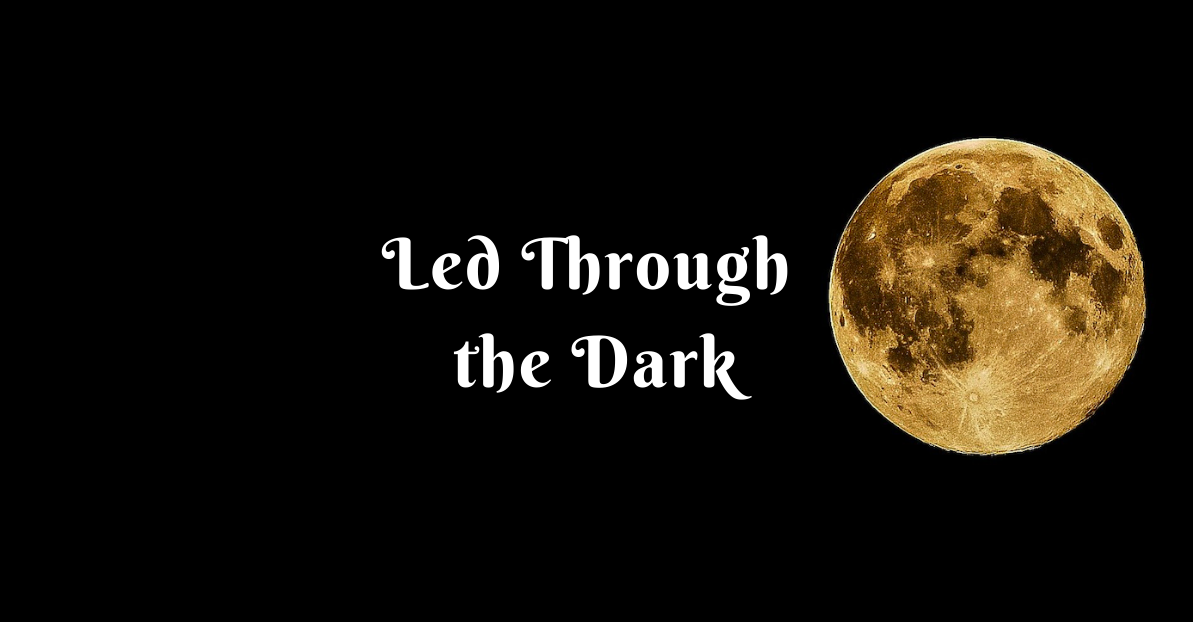Because everyone loves a good story
Led Through the Dark

I’m not afraid of the dark.

That being said, I do prefer to have some light when things get creepy. For example, if I hear a bump in the basement when I’m home alone, you’d better believe I’m flipping on all the lights to check it out, kitchen knife white-knuckled in one hand and my phone clutched in the other. But I’m not afraid of the dark.
No, I’m not, but I do admit that there are times when a little more light would be helpful. Take, for instance, the first time my friends and I went backpacking in Yosemite, we lost our way as the sun was setting and had to finish the hike by the light of our cheap headlamps. We’d been warned about the potential of bear attacks, so when we heard crunching and shuffling on the switchbacks below us, the hair on the back of our necks stood out like porcupine quills. All we could see below was an occasional glint in the light of our headlamps. Bear eyes, no doubt. Time to throw rocks. When the crunching drew nearer and the glinting grew brighter, we finally had enough light to see the situation clearly. That’s when we stopped throwing rocks at the girl whose headlamp we’d been seeing below us.
Light Is Good…Right?
See, even though I’m not afraid of the dark, I can still think of some pretty good reasons for preferring light. There’s nothing wrong with trying to create a little illumination, right? After all, if we’d been able to shine a floodlight on the trail, maybe we wouldn’t have tried stoning a fellow hiker. We aren’t moles; we are sun-craving, light-dependent people, and that’s all right.
But recently God showed me a different aspect of my desire for light, and it took me off guard. I was reading Isaiah 50 where God is commending the faithfulness of Christ, his Son and Servant. The chapter details some of the torment and derision that Christ willingly endured during his crucifixion, but He continually points back to the Father’s faithfulness to guide and vindicate Him through it. Verses 6-7 say, “I hid not my face from disgrace and spitting. But the Lord God helps me; therefore I have not been disgraced.” He was disgraced, but not ultimately. The Father brought Jesus through the disgrace and out into the light of glory.
Trusting Through the Darkness
And as beautiful as that truth is, the chapter ends with a personal application and challenge regarding light and darkness. Check out verses 10-11.
Who among you fears the Lord
and obeys the voice of his servant?
Let him who walks in darkness
and has no light
trust in the name of the Lord
and rely on his God.
Behold, all you who kindle a fire,
who equip yourselves with burning torches!
Walk by the light of your fire,
and by the torches that you have kindled!
This you have from my hand:
you shall lie down in torment.
Isn’t that surprising? I would have expected verse 10 to say, “Let him who walks in darkness look for the light,” or “The Lord will light a fire to guide his way.” But instead, it tells us to remain in the dark, trust in the Lord, and rely on God. The light isn’t what gets us through the darkness; God is.
The Light of Presumption
Maybe it feels confusing because the Bible often refers to God as light, but in this case the metaphor is different. The light referred to in verse 11 is manmade. It’s self-created confidence. It’s presumption, really—the kind of presumption that says, “I’m going to figure out my future, forge my own path, and forget I’m not God.” The kind of presumption, in fact, that I’m often guilty of.

See, light isn’t the problem. God blesses us with wisdom, guidance, and clarity all the time. But not all the time. There are situations in which God withholds the light of complete understanding. He doesn’t illuminate the whole picture to us at once. As much as I’d prefer to see what’s up ahead, sometimes God just asks me to trust him. To walk with Him through the darkness. And as hard as that is, it sure beats squinting down the switchbacks by the light of my own flimsy headlamp.
Not Afraid of the Dark
We can’t always avoid the darkness. And, according to these verses, we’re not supposed to. Christ Himself walked through the valley of the shadow of death, trusting the Father to lead Him. But because of that, we know we have a faithful Guide.
We don’t need to light our own puny fires in hopes of seeing what’s ahead. That kind of self-reliance is futile and even damning. Instead, let’s hold even more tightly to the Hand that is leading us through the darkness, knowing that with Him by our side, there is nothing to fear.

Great insight, Emily. We always want to know what is ahead. Faith is trusting that your sovereign, loving heavenly father will always be with you in the journey that he has planned.